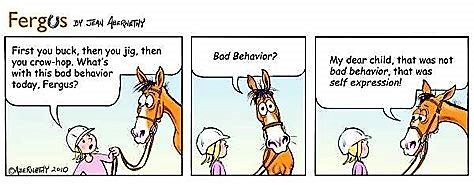
John Fyfe on Riding lessons – Inhibiting Factors
Before embarking on a course or riding lessons consideration should be given to some factors which can inhibit or delay productive learning.
Instructors and Students must address these issues before constructive teaching can be begun.
Some of these inhibiting factors are as follows:
An ill-mannered horse
The ill-mannered horse is, generally, a horse which has never been shown that it can rely on its handler to do right by it, to keep it safe and to give it good advice. It has not learned to be willing to be guided by its handler.
Rider’s fear
Fear is always real and should not be made light of. Most often, it can be overcome by understanding the fear and recognising what triggers it in the individual. Often, its source is in the memory of a past accident. Fear triggers tension and over-reaction.
Rider’s lack of confidence in his or her ability to lead
A student’s lack of confidence in his or her own ability to become the horse’s leader is often the result of past failures, lack of knowledge, lack of experience or simple confusion arising from the plethora of often conflicting advice available. This feeling of inadequacy can often be made worse by having observed numerous fragments of good horsemanship and solutions to problems demonstrated at Clinics by experienced and expert horsemen and women. The point is that, most often, the Clinicians are experienced and experts in their field. The average student’s lack of experience is not something to be ashamed of. It is just a place to start.
Over protective attitude towards the horse
An over protective attitude towards the horse may not be seen by some as a hindrance to learning but it can be for horse and rider. Horses do not respect or understand the mushy sentimental behaviour exhibited by some owners. Love him, but do not forget he is a horse. Horses enjoy being one of a herd and knowing their place in it. The rules laid down by a herd are clear and are policed with a firm and fair hand or rather a set of gestures backed up by a set of teeth and hooves. Horses are not “poor defenceless creatures” and to suggest so is disrespectful.
Unrealistic ambition
Another significant handicap to learning is a rider’s ambition, the “walk before you can run” syndrome. By this, I mean ambition that leads riders to believe that they “know all that stuff and do not need to practise” and “I want to get to the interesting stuff now”. Musicians, athletes and martial artists cannot develop their ability with that attitude unless, of course, they are born with superpowers. They know that systematic practice is the only road to success. Why should students of horsemanship think themselves different?
Physical limitations of rider or horse
Physical disabilities affecting horse or rider will generally affect the practice programme or the way of riding but will not necessarily inhibit learning. The student’s programme of work can be adjusted to accommodate his or her circumstances. Sometimes it is advisable to seek medical advice before commencing the more physically demanding parts of a course of instruction. Students have a responsibility to themselves and the course organisers to ensure that they have no medical conditions that would indicate that they should not participate in all or any part of the course.
Constraints on practice time
Constraints on practice time have to be taken into consideration. The learning to ride competently requires practice and more practice. If the student cannot practice between lessons, his or her progress will be slow. Both Student and Instructor must take a realistic view of this.